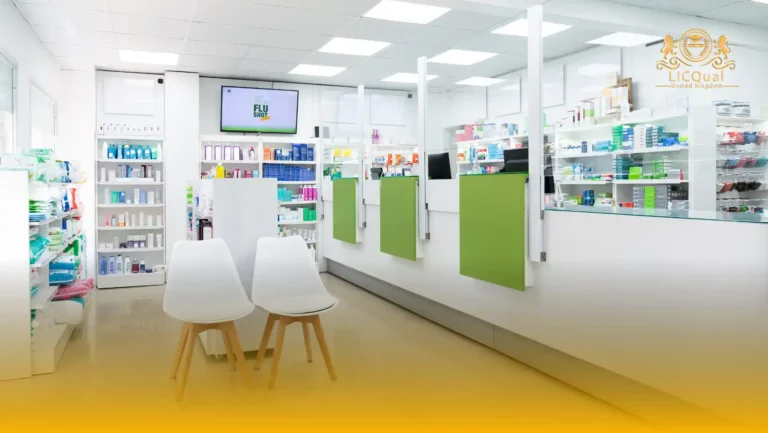The LICQual Level 7 Postgraduate Diploma in Pharmacoeconomics (PgD Pharmacoeconomics) is an advanced qualification designed for professionals seeking to elevate their expertise in the economic evaluation of pharmaceuticals and healthcare interventions. This postgraduate diploma is ideal for learners aiming to enhance their career prospects, broaden their knowledge in pharmacoeconomic methodologies, and achieve significant Continuing Professional Development (CPD) milestones.
This qualification is specifically tailored for experienced professionals and is not intended for fresh candidates. Learners undertaking this programme will gain an in-depth understanding of the principles of pharmacoeconomics, health technology assessment, cost-effectiveness analysis, and budget impact evaluation. The curriculum is designed to develop critical analytical skills, enabling learners to assess the economic value of pharmaceuticals and make informed decisions in healthcare policy, clinical practice, and research.
Centres delivering this prestigious qualification are required to maintain the highest standards of teaching and learning. This includes employing competent and qualified staff with expertise in pharmacoeconomics, health economics, and related fields, as well as providing learners with access to all essential materials, databases, analytical tools, and technological resources. By ensuring these rigorous standards, centres can offer a high-quality learning experience that maximises learner success and professional growth.
Enrolling in the Level 7 Postgraduate Diploma in Pharmacoeconomics allows learners to acquire an internationally recognised qualification that demonstrates advanced expertise in economic evaluation, supports career advancement in the pharmaceutical and healthcare sectors, and strengthens the learner’s ability to contribute to evidence-based healthcare decision-making.
Course Overview
Qualification Title
LICQual Level 7 Postgraduate Diploma in Pharmacoeconomics (PgD Pharmacoeconomics)
Total Units
6
Total Credits
120
GLH
600
Qualification #
LICQ2201224
Qualification Specification
To enroll in the Level 7 Postgraduate Diploma in Pharmacoeconomics (PgD Pharmacoeconomics), applicants must meet the following criteria:
|
Qualification# |
Unit Title |
Credits |
GLH |
|---|---|---|---|
|
LICQ2201224-1 |
Principles of Pharmacoeconomics |
20 |
100 |
|
LICQ2201224-2 |
Health Technology Assessment and Policy Evaluation |
20 |
100 |
|
LICQ2201224-3 |
Advanced Economic Modelling in Healthcare |
20 |
100 |
|
LICQ2201224-4 |
Budget Impact Analysis and Resource Allocation |
20 |
100 |
|
LICQ2201224-5 |
Research Methodologies and Data Analysis in Pharmacoeconomics |
20 |
100 |
|
LICQ2201224-6 |
Advanced Capstone Project in Pharmacoeconomics |
20 |
100 |
By the end of this course, learners will be able to:
Unit 1: Principles of Pharmacoeconomics
Learners will be able to
- Critically evaluate the core principles of pharmacoeconomics, including cost-effectiveness, cost-utility, and cost-benefit analyses
- Analyse the role of pharmacoeconomics in healthcare decision-making and policy development
- Assess the economic value of pharmaceutical interventions in different healthcare contexts
- Apply pharmacoeconomic concepts to inform evidence-based clinical and managerial decisions
Unit 2: Health Technology Assessment and Policy Evaluation
Learners will be able to
- Examine methodologies for health technology assessment (HTA) and their application in healthcare decision-making
- Critically evaluate healthcare policies using economic and outcome-based frameworks
- Analyse comparative effectiveness research to inform clinical and policy decisions
- Integrate HTA findings into recommendations for healthcare resource allocation
Unit 3: Advanced Economic Modelling in Healthcare
Learners will be able to
- Develop and apply decision-analytic models, including decision trees, Markov models, and simulation techniques
- Analyse the economic impact of pharmaceuticals using advanced modelling methods
- Critically evaluate model assumptions, limitations, and outcomes in pharmacoeconomic studies
- Integrate modelling results into practical recommendations for healthcare decision-making
Unit 4: Budget Impact Analysis and Resource Allocation
Learners will be able to
- Conduct comprehensive budget impact analyses to assess financial implications of healthcare interventions
- Evaluate strategies for efficient allocation of healthcare resources in different settings
- Assess the economic consequences of policy decisions on healthcare delivery
- Apply budget impact findings to support strategic planning and decision-making in healthcare systems
Unit 5: Research Methodologies and Data Analysis in Pharmacoeconomics
Learners will be able to
- Design advanced research studies in pharmacoeconomics using quantitative and qualitative methodologies
- Analyse complex datasets using statistical and econometric techniques
- Critically appraise scientific literature to support evidence-based practice
- Apply research findings to enhance policy, practice, and professional decision-making in pharmacoeconomics
Unit 6: Advanced Capstone Project in Pharmacoeconomics
Learners will be able to
- Integrate knowledge from all units to design, execute, and present a comprehensive research or applied project
- Demonstrate advanced problem-solving, critical thinking, and evidence-based decision-making skills
- Evaluate project outcomes and propose improvements or innovative solutions
- Communicate complex pharmacoeconomic concepts effectively to professional and academic audiences
The LICQual Level 7 Postgraduate Diploma in Pharmacoeconomics (PgD Pharmacoeconomics) is designed for healthcare professionals, pharmacists, researchers, and policy makers who want to master the balance between clinical outcomes and economic efficiency. This internationally recognized postgraduate diploma in pharmacoeconomics is ideal for those seeking career growth, specialization, and global accreditation. Whether you are working in hospitals, pharmaceutical industries, government agencies, or academic institutions, this program equips you with the skills to make evidence‑based, cost‑effective healthcare decisions.
1. Practicing Pharmacists Seeking Career Advancement
- Pharmacists aiming to move into senior roles in healthcare economics
- Professionals looking for international recognition through PgD Pharmacoeconomics qualification
- Those wanting to strengthen knowledge in cost‑effectiveness and therapeutic management
- Pharmacists seeking eligibility for advanced postgraduate pathways
- Individuals aiming to enhance patient‑centered pharmaceutical care with economic insights
2. Healthcare Policy Makers and Administrators
- Government officials involved in healthcare budgeting and resource allocation
- Policy makers seeking Level 7 Pharmacoeconomics diploma UK accredited credentials
- Administrators aiming to design cost‑effective healthcare systems
- Professionals responsible for evaluating drug pricing and reimbursement policies
- Leaders preparing for strategic roles in healthcare management
3. Pharmaceutical Industry Professionals
- Experts working in drug development and market access teams
- Professionals seeking postgraduate diploma in pharmacoeconomics online flexibility
- Those aiming to improve knowledge in cost‑benefit analysis and clinical trials
- Industry specialists preparing for leadership positions in pharmaceutical economics
- Individuals wanting to align product strategies with global healthcare standards
4. Hospital and Clinical Pharmacy Professionals
- Hospital pharmacists managing complex therapeutic cases with budget constraints
- Clinical pharmacy specialists working with multidisciplinary teams
- Professionals seeking PgD Pharmacoeconomics distance learning course options
- Those aiming to improve patient safety while optimizing healthcare costs
- Pharmacists preparing for leadership roles in hospital management
5. Academic and Research Professionals
- Lecturers and trainers in pharmacy, economics, and healthcare education
- Researchers seeking PgD Pharmacoeconomics international qualification for academic credibility
- Those aiming to publish studies on healthcare economics and drug evaluation
- Educators wanting to align with global accreditation standards
- Academic staff preparing students for advanced pharmacoeconomics practice
6. International Healthcare Professionals
- Pharmacists outside the UK seeking globally recognized qualifications
- Professionals aiming for international career mobility in healthcare economics
- Those wanting affordable postgraduate diploma in pharmacoeconomics options
- Practitioners seeking flexible online learning opportunities
- Healthcare workers preparing for advanced licensing or accreditation
7. Early‑Career Graduates and Aspiring Specialists
- Recent pharmacy or healthcare graduates seeking specialization in pharmacoeconomics
- Individuals wanting to fast‑track career success with PgD Pharmacoeconomics
- Those aiming to build strong foundations in health economics and resource management
- Graduates preparing for leadership and advanced postgraduate studies
- Professionals seeking mentorship and structured career pathways
Centres delivering the Level 7 Postgraduate Diploma in Pharmacoeconomics must meet high standards to ensure quality learning and learner success. Requirements include:
- Employ highly qualified and experienced staff with expertise in pharmacoeconomics, health economics, and related healthcare disciplines
- Provide learners with access to up-to-date study materials, academic journals, databases, and analytical software for comprehensive learning
- Maintain well-equipped facilities, including computer labs and research tools, to support advanced data analysis and modelling
- Ensure learners have access to technological resources required for research, statistical analysis, and project completion
- Implement robust quality assurance processes to maintain compliance with national and international educational standards
- Offer guidance and support services to help learners achieve learning outcomes and successfully complete the programme
By meeting these centre requirements, institutions can provide a high-quality learning environment that supports learner success, fosters advanced professional development, and delivers the Level 7 Postgraduate Diploma in Pharmacoeconomics to the highest international standards.
Assessment and Verification
All units within this qualification are subject to internal assessment by the approved centre and external verification by LICQual. The qualification follows a criterion-referenced assessment approach, ensuring that learners meet all specified learning outcomes.
To achieve a ‘Pass’ in any unit, learners must provide valid, sufficient, and authentic evidence demonstrating their attainment of all learning outcomes and compliance with the prescribed assessment criteria. The Assessor is responsible for evaluating the evidence and determining whether the learner has successfully met the required standards.
Assessors must maintain a clear and comprehensive audit trail, documenting the basis for their assessment decisions to ensure transparency, consistency, and compliance with quality assurance requirements.







